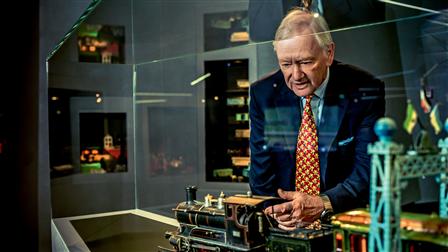
A dream come true
Shipshape: Large ships are a familiar sight in this rather unusual
A Perfectionist’s Passion. Hans-Peter
“Here, take a look at this typical ‘Crocodile,’ a Märklin replica of the famous locomotive. And the ships over there—each one more beautiful than the last—and everything so exact, right down to the last detail. Now that’s craftsmanship.” A very personable white-haired gentleman in a dark jacket and red tie with a bear pattern guides his guests through the exhibit. A gentleman with alert, sparkling eyes, who is always smiling. Each new toy exhibit fills him with enthusiasm from head to toe and brings yet another twinkle to his eyes.
Hans-Peter
![[+]](https://staging.www.porsche.com/filestore/image/multimedia/none/christophorus-issue377-article08-content-01/normal/303ee80c-3925-11e6-8697-0019999cd470/porsche-normal.jpg)
On the road: The precision found in the scaled-down world is nothing short of impressive—as can be seen with this
“Back in 1977, I wanted to build an H0-scale railroad from Märklin for my four-year-old son, also in reminiscence of my own model railroad. The journey to the toy store in Bad Reichenhall proved a fateful one.” Fateful because Hans-Peter
Flying high:
“Come on over here and take a look at this swimming pool from 1910, which I kept in my study at home. If you fill the pool with water and press that pump, the little shower actually works. That’s one of the highlights here at the TraumWerk.” Hunting trophies are what you might expect to see in a study. But not if that study belongs to Hans-Peter
![[+]](https://staging.www.porsche.com/filestore/image/multimedia/none/christophorus-issue377-article08-content-02/normal/bc0ffd60-3927-11e6-8697-0019999cd470/porsche-normal.jpg)
Looking back: Early 911s being loaded in front of the
The country life:
The tour of the exhibition takes visitors past submarines, ships, steam-engine plants, and automobiles. The exhibits depict every era and include pieces from select toy manufacturers from around the world. The oldest piece: a locomotive from 1865. Some exhibits, such as the thimble-sized tin barrel, are practically a bargain at 50 euros. Others, such as the ship as large as a moving box, are worth as much as a single-family home.
And finally, there’s the large wall exhibit featuring pedal and electric cars for children, including a silver
It goes without saying that car enthusiasts will also find plenty to enjoy in Mr.
![[+]](https://staging.www.porsche.com/filestore/image/multimedia/none/christophorus-issue377-article08-content-03/normal/8f1b9e69-3928-11e6-8697-0019999cd470/porsche-normal.jpg)
Arrived: Here, in the district of Berchtesgadener Land, Hans-Peter
“Hurry everyone, it’s about to start!”
We are now in the heart of the TraumWerk: a 365-square-meter landscape reaching 5 meters high. A piece of Europe in miniature: Austria, Switzerland, and Germany, including Lake Constance. In total one hundred and eighty trains, all from
The heart of the TraumWerk: A Märklin model train travels through the most beautiful regions of the Alps. The lovingly designed boathouse is situated on the shores of Wörthersee.
There’s so much to discover: a raised dance floor in Salzburgerland; a pair of lovers in a secluded mountain spot (“Those rascals slipped that one past me”); the welding robots that shoot sparks at the
There were a few unexpected snags waiting in the wings. “Before we opened, the exhibition area was too dry. This caused too much movement in the wood, some of the rails came loose, the entire installation was coming apart at the seams. We had a lot to learn.” But that’s all in the past now. These days, Hans-Peter
By Bernd Zerelles
Photos by Theodor Barth
TraumWerk
Zum Traumwerk 1, 83454 Anger-Aufham, Germany
Museum hours:
Tuesday through Sunday, 9:00 a.m. to 5:30 p.m.
Closed Monday
![[+]](https://staging.www.porsche.com/filestore/image/multimedia/none/christophorus-issue377-article08-margin-01/normal/ffff14e7-3924-11e6-8697-0019999cd470/porsche-normal.jpg)
![[+]](https://staging.www.porsche.com/filestore/image/multimedia/none/christophorus-issue377-article08-margin-02/normal/6d8411b5-3926-11e6-8697-0019999cd470/porsche-normal.jpg)
![[+]](https://staging.www.porsche.com/filestore/image/multimedia/none/christophorus-issue377-article08-margin-03/normal/3882489c-3927-11e6-8697-0019999cd470/porsche-normal.jpg)
![[+]](https://staging.www.porsche.com/filestore/image/multimedia/none/christophorus-issue377-article08-margin-04/normal/13021f6e-3e15-11e6-8697-0019999cd470/porsche-normal.jpg)
![[+]](https://staging.www.porsche.com/filestore/image/multimedia/none/christophorus-issue377-article08-margin-05/normal/a6a5e5b4-3e15-11e6-8697-0019999cd470/porsche-normal.jpg)










